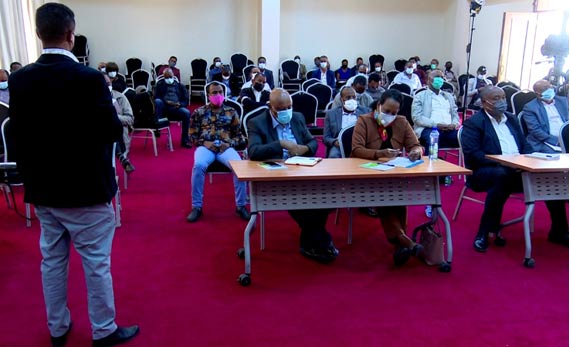Stakeholders have conducted a discussion on National Agricultural Extension System Roadmap
ADPLAC in through the financial support from Agricultural Research Council Secretariat (EARCS) and African Forum for Agricultural Advisory Services (AFAAS) has conducted a national policy dialogue under the theme “Pluralistic extension system in the context of Climate Smart Agriculture” in Adama town with 50 participants came from different organizations.
Opening Session

Mr. Abera Mulat, Adviser for the Agricultural development sector, delivered an opening speech on behalf of the His Excellency Ato Germame Garuma, Acting State Minsiter for Agriculture. In his speech he pointed out that a ten-year master plan has been prepared and implemented. According to Abera, the institute is undergoing different reforms to modernize Ethiopian agriculture. Abera urges the stakeholders to participate actively to forwarded agricultural extension roadmap and strategy, which will contribute a lot to our agricultural development.
Objectives of the Agricultural Extension Strategy
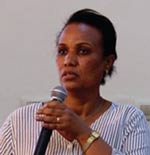
Yenenesh Egu, Director, Agricultural Extension Directorate, Ministry of Agriculture (MoA) pointed out the objective of the roadmap. Accordingly, she highlighted the vision, mission, purpose, key principles, pillars, the bottlenecks, and recommendations. Describing the overall agricultural extension of the country, Yenenesh outlined the main points mentioned in the Extension Strategy. “The strategy will be realized, if and only if we do more for its implementation through tackling the bottlenecks we faced,” she mentioned.
Alemayehu Gemechu on his part said the agricultural extension strategy has been drafted for four years. Therefore, great efforts have been made to carry out these activities in collaboration and coordination with relevant stakeholders, Alemayehu said. He said several guidelines, various
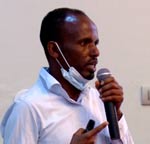
activities and training has been provided for the given professionals at each level. Alemayehu reminds that 35 thousand tablets have been distributed to development Agents (DAs).
During this event, the draft roadmap of agricultural extension system has been presented and discussed in-depth by the workshop participants. The draft of the National Agricultural Extension Roadmap has been developed primarily by experts at Ministry of Agriculture (MoA), Ethiopian Agricultural Research Council Secretariat (EARCS), and other Development Partners.
The roadmap has highlighted experience from the country and elsewhere, SWOT analysis, and forwarded key priority areas in the form of pillars. Participants discussed at length and provided feedback and inputs for consideration.
Different stakeholders drawn from different institutions have been engaged on the discussions of the proposed extension roadmap. As a result, federal and regional higher officials, extension experts, university scholars, agricultural researchers, and representatives of non-governmental organizations have participated on a draft roadmap discussion who forwarded suggestions, comments, and ideas as input.
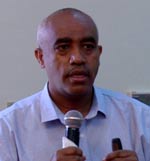
One of the roadmap presenters, Akalu Teshome (Ph.D), pointed out about the ten pillars of the roadmap and the general purpose of the roadmap, the detailed objectives, the roadmap survey and the strategy. Experiences from India, Brazil, China and Rwanda from abroad were included in the roadmap.
As to Akalu, the gaps in federal structure have been identified and the ratio of development workers and farmers is 1: 237 whereas India is 1: 5,000, but there is a big gap between the two in terms of using technologies.
CIMMYT is one of the partners that participated in this event made presentation on “Towards Climate Smart Agriculture” Conservation Agriculture-based sustainable intensification system in Ethiopia”. According to Kinde Tesfaye (Ph.D) from CIMMYT, smallholder farmers are engaged in integrated agriculture and despite the increase in crop and livestock production, the growth is not sustainable enough.
As to Kinde, the main function of the agricultural extension is to facilitate the situation and not to be directly involved in the work. He says, “if it is done more on building capacity, the development workers will create market linkages; It is difficult to implement the extension directly, unless we facilitate the extension focusing on changing the knowledge, skills, and attitudes of every farmer”, Kinde underlines.
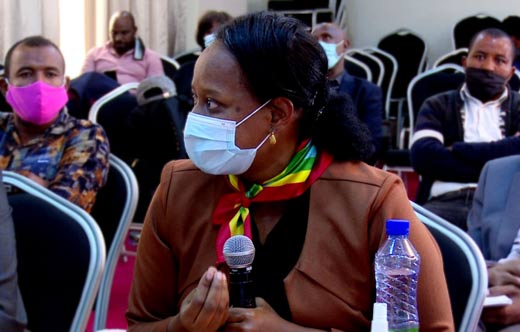
In this event, Her Excellency Honorable Almaz Melese, the Chairperson of Agricultural Standing Committee of the House of Peoples Representatives (HPR), states that discussion will be used as input for the extension roadmap and Farmers’ Training Centers (FTCs) should go on building the farmers capacity focusing on how to do so practically. As to her, coordination should begin with planning and emphasis should be placed on building the capacity of development workers. On the other hand, the problem needs to be identified and solved in terms of building the capacity of the farmers in the professional sectors and by the private sector. “There is still gabs to benefit women and youth from agriculture; we need to attract them to be engaged in our agricultural development sector. For this reason, Agriculture must be supported by mechanization and FTCs need to be active and attractive through focusing on agroforestry,” she said.
On the occasion, several ideas and comments arose from the participants are very essential to enrich the draft roadmap that will move forward the extension system (from theory to real practice) if the functions should accomplish accordingly. Furthermore, it is also expected to be aligned with the sector reform agenda. Finally, the meeting has been concluded with the agreed action point; “All stakeholders should do their own part to modernize Nation’s agriculture and save its economy.”

